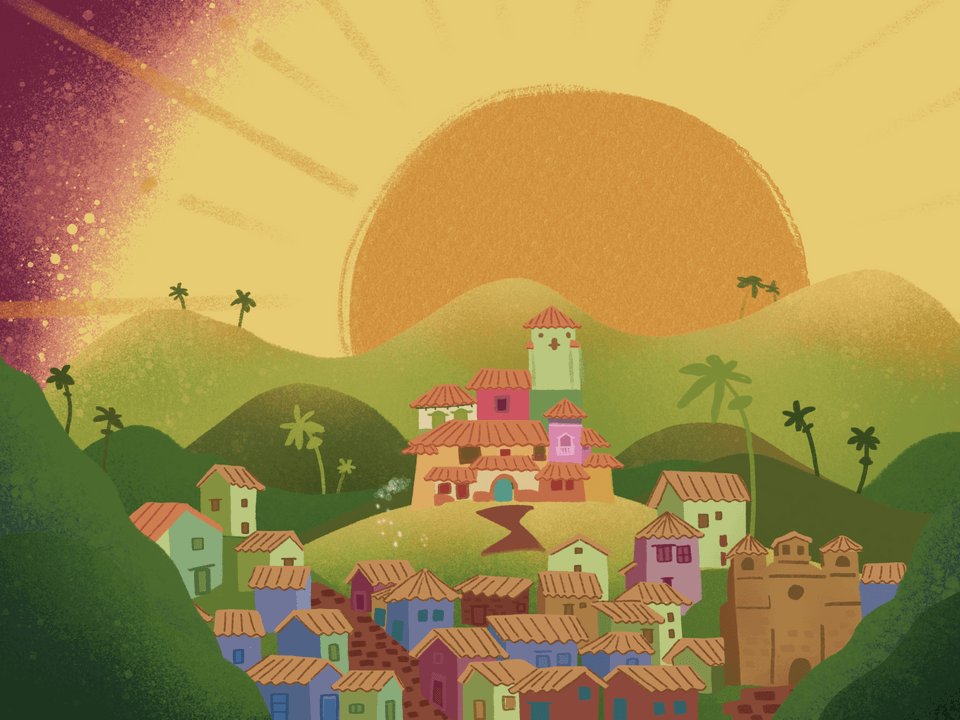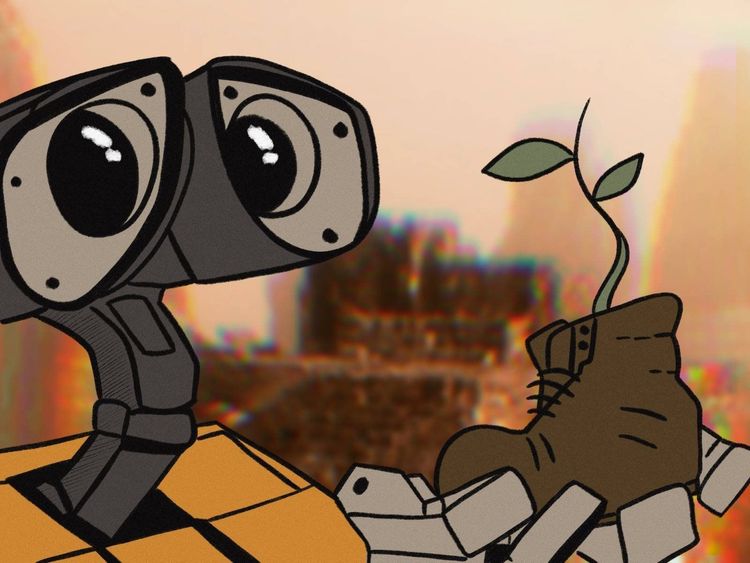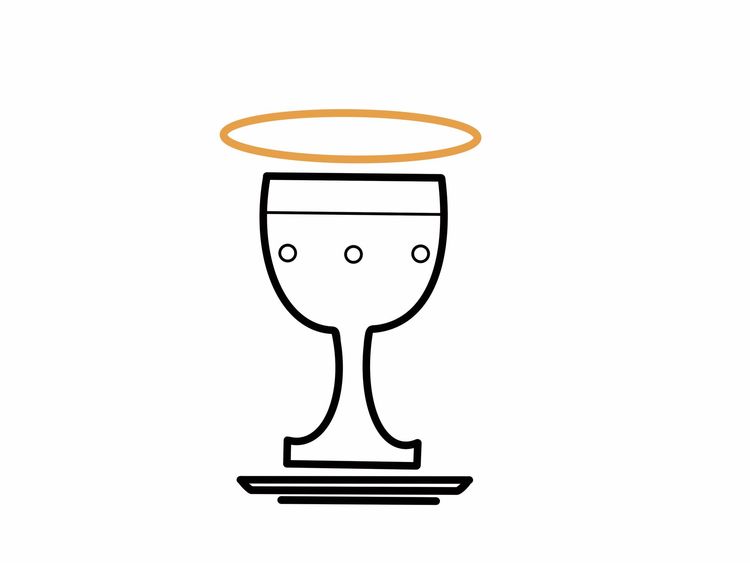Encanto: The Miracle is You

Art: © Jessica Keiko Mitsumasu
I seek not what is yours but you.
This phrase would’ve been a fitting tagline to Disney’s Encanto. Situated in the beautiful hills of Colombia, the film follows the story of the Madrigal family and their miracle gifts in sustaining their local community. We experience the narrative through Mirabel, the sole member of the family who never received a miracle and has since always felt rather un-special.
Unlike her family members, whose gifts benefit both the family and the townsfolk, Mirabel cannot equally contribute to the wellbeing of her family and internalizes this as a kind of inadequacy, not least because the family matriarch is particularly harsh with her. But, how exactly does one compete with moving mountains and blooming perfect bouquets with a twirl of one’s hair?
The story, I imagine, hits quite close to home. Many of us are familiar with the pressure of performance, of a standard imposed on us from without. For many that come from backgrounds similar to the Madrigals, the pressure is often familial or parental. The language is positive but heavy. Make your family proud. Do it for the family. Children need to bring honour to the family, and sometimes that looks like children performing well in school, getting respectable jobs, getting married and having a boatload of kids.
While some of those achievements, like school success and a career, are typical aspirations for the average North American, the motivations for achievement contrast across cultures. In the film, as for many across the world, those goals are not matters of individual self-actualization. Instead, they are pursued for a community, an entire body that benefits from one person’s contributions. To many in the West, this is almost foreign. The cultural narrative in the West typically focuses on pursuing one’s passions or desires.
Yet what is common to both trajectories, individual or communal, is the idea that the pressure exists.
The Pressures of Community
For Mirabel, her identity is inextricably tied to her role in the family. Who is she? She is a Madrigal. The movie starts with a song about her relatives, not her personality. But after her younger cousin receives a miracle gift to communicate with animals, Mirabel re-encounters her deepest turmoil as the one to whom no miracle was ever given. “Show this family something new. Who I am inside, so what can I do?” It is not her lack of gift per se that is distressing, but what it means for who she is in relation to others and her role in the family. It is telling that when she considers “who I am,” it is immediately tied to the notion of “what can I do.” She ties her identity to function, which is tied to her place in the family Madrigal.
This identity-function theme also plagues other characters. For example, Luisa keeps it all together on the surface, but underneath she’s taxed beyond her limits. “Who am I if I can’t carry it all?” It’s less about her ability and more about being seen as the one who carries the community’s donkeys. She has found her identity in how she serves. Yet, as she loses strength, her sense of self begins to slip away.
Or consider Isabella, the perfect daughter. She never wanted to marry Mariano, but she took it upon herself as the face of the family to form such unions. The roses are stunning, but life is more than aesthetics. “I’m so sick of pretty; I want something true.” She also feels the pressure.
Even the matriarch, Abuela, feels the weight of performance. But for her, the audience is different. Her grandchildren perform for her family, but she performs for the village at large, bearing the weight of guardian for them all since the miracle candle rescued them from their attackers decades before. She then transmits the pressure she feels to her own family.
It is a burdened life to feel the constant weight of people’s expectations. If it doesn’t crush us, it shows up in cracks, as in Luisa’s sobs. More worryingly, such a life erases us as people. We become our function, never mind our angst or aspirations. As long as we perform as required, whether as the beauty or the brawn, our idiosyncrasies don’t even matter. To frame it somewhat religiously, who we are as individuals is unimportant when the community is our god, and we can be readily sacrificed to it.
The Paradox of Self-Approval
At this point, it may be easy to conclude that seeking the approval of others is entirely flawed. We may figure we just need to live authentically for ourselves. But it’s not so simple. Individualistic cultures have only shifted the weight of identity onto our own shoulders. As philosopher Alain de Botton has said, “Except in societies where it is fixed at birth and our veins flow with noble blood, our position hangs on what we can achieve.” Identity is not given but must be made.
Yet this too fails to satisfy for three reasons.
First, self-imposed pressure is still pressure. It may show up as self-criticism or anxiety. In the former case, we are constantly questioning how to do something better, and we may even take a degree of pride in our dissatisfaction with “settling” with things that are less than perfect. But the reality is, we never live up to our standards. Are we always as nice as we could be or as patient as possible? As diligent and hardworking? We all fall short of perfection, but if we have a penchant to expect it, we are all the more devastated when we fail.
In the case of anxiety, we are perpetually on edge. If identity is not a given, we must create it. The results are up to me. If I fail, nobody else is to blame, and nobody else can help me. The philosopher Jean-Paul Sartre observed this, making the existentialists one unhappy group. We like self-definition in our culture, but we ought to be cautious on closer inspection. If identity purely rests on me, I must bring all chaotic circumstances under my control. I must constantly be tending to and considering how specific outcomes can be achieved. In day-to-day life, this is the obsession around whether or not I should take this job, or if I am marrying the right person, and what will happen if I botch this test or interview. If the outcomes of these encounters build our identity, there is no surprise that we fret incessantly. When you’re born a king, you don’t worry about status. But when you’re born a nobody and need to create that identity, well, you best be as diligent as you can.
Even if we bypass this initial hurdle of self-judgment and urge ourselves to be content regardless of performance, we alienate the importance of the perspectives and relationships around us. If I say that I am happy with who I am and that I don’t care what anyone else thinks, I am in effect saying that nobody else matters. Consider when career paths take us away from loved ones. If we left them without a second thought to pursue our dreams, one might question how much we love those people in the first place. This does not imply we should never move, but it examines the role of love in our lives. Taken to its logical conclusion, this perspective is simply selfishness, and a lack of input leads to isolation. In many ways, our cultural narratives have encouraged us to live this way, but we know loneliness is real in our quiet moments.
Yet there’s another problem with placing identity solely on ourselves. It simply isn’t possible. We all look to others despite our efforts. The most cherished things about our identity all require social context. It is an unusual thing for us to care about the fact that we have precisely X number of hairs on our heads. Instead, when we say we are caring or fun, these are social descriptions. If we have made it to the top of our careers, we have done so against others. Luisa is not strong in the abstract—maybe she’s a weakling compared to Hercules—but she is stronger than anyone else in town. What contributes to our identity is that we are defined in contrast to other community members. We may like to think we define ourselves, but it simply isn’t true.
Whether we perform for others or seek to define ourselves, pressure always exists, and the community always plays a role.
Not Good Enough
What we must appreciate then is that Encanto is not a story about how communities can crush us. It draws attention to the reality of pressure but considers how we can move past its weight in meaningful ways.
When Mirabel stands before Abuela and confronts her about the deep-seated heartache of a grandchild that has never felt she would be good enough, we receive a picture of the brokenness we all feel in our most vulnerable moments. We all know what it is not to be good enough, whether the judge is our parent, our boss, or ourselves. In those times, we feel overwhelmed and exasperated that despite our best efforts, we simply cannot achieve perfection.
Facing our inadequacies is the first step to releasing their power over us because it is an admission—confession even. Rather than be distracted by the mirage of perfection, we attend to the reality that nobody is ever good enough. In both Encanto’s universe and our meritocratic world, we constantly measure ourselves by our accolades, and unfortunately for us, there are no limits to them. We can always achieve more, do more, be more. It’s depressing. This is why admission is critical. We no longer chase after a shadow.
After Mirabel’s admission, Abuela begins to see her own failings as well. This is the beauty of such a confession. It convicts in ways that sheer repetition cannot. What turns Abuela around is not that Mirabel yells at her but that Mirabel has revealed her soul. Vulnerability opens us to others because it is the precondition of love. And love is the way past our inadequacies.
What the Madrigals realize—that is, after their home collapses and they are rebuilding without their miracle gifts—is that behind their performances, there are people. In one sense, they never lost sight of this. Luisa was always Luisa, but Luisa was the strong one. There was a subtitle, a stipulation that couldn’t be erased. After the gifts are lost, Luisa becomes Luisa as Luisa. Or in Abuela’s words to her children,
“The miracle is not some magic that you’ve got. The miracle is you, not some gift, just you. The miracle is you.”
Embracing inadequacy removes the pressure of performance, which allows a frame shift. The pressure is released because life in this realm operates according to a different scale from either community or individual-based achievement. The shift enables us to see differently, from a lens of merit to a lens of love, and love pierces through the veil of what we are for who we are.
Furthermore, the community is not negated in the new paradigm. Love is necessarily relational. Mirabel has not forsaken her family or simply chosen to define herself apart from them. On the contrary, her identity solidifies because of their approval, and their approval no longer crushes because the “veil of what” is lifted.
Approval and the Identity of Love
We all need approval to know we matter. We try to find it in our performance or self-concept, but both fall flat. We need a special kind of approval that is a gift of grace. It is firmly an approval based on unconditional love. It is to hear the words, “I seek not what is yours but you.” Anything less than this necessarily disappoints.
Equally important, receiving such approval causes us to build a degree of identity in that love. If we were to go about demanding others love us for who we are with no regard for how we relate in return, we would reveal a misunderstanding of the nature of love. When we are loved, we long to love in response and find ourselves therein. My spouse’s love makes me want to care more, to dive deeper into the relationship. The love of my children makes me want to be not just a better man but a better father. The love engages a specific relational dynamic. Mirabel is delighted to find her identity once more as a Madrigal, not ultimately as an individual who simply becomes comfortable in herself. The love of her family invites her to find herself once more among them.
Encanto is a beautiful movie. The landscapes are stunning, and the music addictive. But most importantly, it challenges our individualistic ideas of identity while also confronting the brokenness of a community that reduces us to our functions. At the heart of this once more is love. Not fuzzy feelings. Not relentless duty. Love looks past our weaknesses to our very souls, and love gives us the basis for identity in its very relationships.





Member discussion